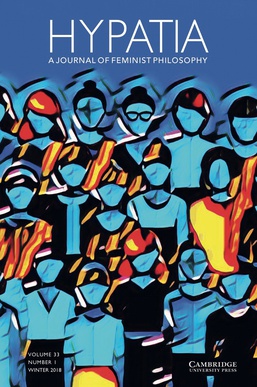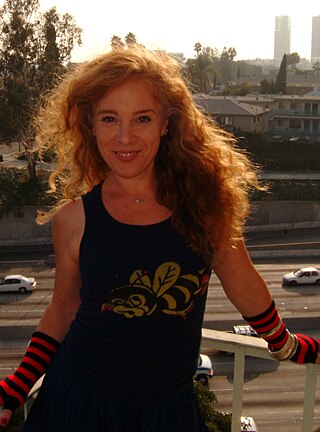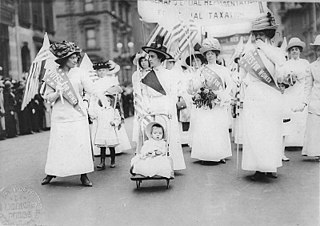
Christina Marie Hoff Sommers is an American author and philosopher. Specializing in ethics, she is a resident scholar at the American Enterprise Institute. Sommers is known for her critique of contemporary feminism. Her work includes the books Who Stole Feminism? (1994) and The War Against Boys (2000). She also hosts a video blog called The Factual Feminist.
Women's studies is an academic field that draws on feminist and interdisciplinary methods to place women's lives and experiences at the center of study, while examining social and cultural constructs of gender; systems of privilege and oppression; and the relationships between power and gender as they intersect with other identities and social locations such as race, sexual orientation, socio-economic class, and disability.
Sandra G. Harding is an American philosopher of feminist and postcolonial theory, epistemology, research methodology, and philosophy of science. She directed the UCLA Center for the Study of Women from 1996 to 2000, and co-edited Signs: Journal of Women in Culture and Society from 2000 to 2005. She is currently a Distinguished Professor Emeritus of Education and Gender Studies at UCLA and a Distinguished Affiliate Professor of Philosophy at Michigan State University. In 2013 she was awarded the John Desmond Bernal Prize by the Society for the Social Studies of Science (4S).

Signs: Journal of Women in Culture and Society is a peer-reviewed feminist academic journal. It was established in 1975 by Jean W. Sacks, Head of the Journals Division, with Catharine R. Stimpson as its first editor-in-Chief, and is published quarterly by the University of Chicago Press. Signs publishes essays examining the lives of women, men, and non-binary people around the globe from both historical and contemporary perspectives, as well as theoretical and critical articles addressing processes of gendering, sexualization, and racialization.

Michael Scott Kimmel is an American retired sociologist specializing in gender studies. He was Distinguished Professor of Sociology at Stony Brook University in New York and is the founder and editor of the academic journal Men and Masculinities. Kimmel is a spokesman of the National Organization for Men Against Sexism (NOMAS) and a longtime feminist. In 2013, he founded the Center for the Study of Men and Masculinities at Stony Brook University, where he is Executive Director. In 2018 he was publicly accused of sexual harassment. He filed for retirement while Title IX charges were pending; no charges were subsequently filed.
Daphne Patai is an American scholar and author. She is professor emeritus of the Department of Languages, Literatures, and Cultures at the University of Massachusetts Amherst. Her PhD is in Brazilian literature, but her early work also focused on utopian and dystopian fiction. She is the daughter of the anthropologist Raphael Patai.

Hypatia: A Journal of Feminist Philosophy is a peer-reviewed academic journal published quarterly by Cambridge University Press. As of January 2024, the journal is led by co-editors Katharine Jenkins, Aidan McGlynn, Simona Capisani, Aness Kim Webster, and Charlotte Knowles. Book reviews are published by Hypatia Reviews Online (HRO). The journal is owned by a non-profit corporation, Hypatia, Inc. The idea for the journal arose out of meetings of the Society for Women in Philosophy (SWIP) in the 1970s. Philosopher and legal scholar Azizah Y. al-Hibri became the founding editor in 1982, when it was published as a "piggy back" issue of the Women's Studies International Forum. In 1984 the Board accepted a proposal by Margaret Simons to launch Hypatia as an autonomous journal, with Simons, who was guest editor of the third (1985) issue of Hypatia at WSIF, as editor. The editorial office at Southern Illinois University Edwardsville handled production as well until Simons, who stepped down as editor in 1990, negotiated a contract with Indiana University Press to publish the journal, facilitating the move to a new editor.
Education sciences, also known as education studies, education theory, and traditionally called pedagogy, seek to describe, understand, and prescribe education including education policy. Subfields include comparative education, educational research, instructional theory, curriculum theory and psychology, philosophy, sociology, economics, and history of education. Related are learning theory or cognitive science.

Shira Tarrant is an American writer on gender politics, feminism, sexuality, pop culture, and masculinity. Tarrant's books include When Sex Became Gender, Men and Feminism, Men Speak Out: Views on Gender, Sex, and Power, Fashion Talks: Undressing the Power of Style, and the forthcoming New Views on Pornography. She is described as an "unconventional feminist" redefining gender rights, and is considered "a national leader in working with younger feminist men". She was identified in 2010 as an "extraordinarily accomplished thought leader" by the national Women's Media Center. In 2012, she was named a Glidden Visiting Professor at Ohio University.

Feminism is aimed at defining, establishing, and defending a state of equal political, economic, cultural, and social rights for women. It has had a massive influence on American politics. Feminism in the United States is often divided chronologically into first-wave, second-wave, third-wave, and fourth-wave feminism.
Andrea Lee Press is an American sociologist and media studies scholar. She is the William R. Kenan Jr. Professor of Media Studies and Sociology, and Chair of the Media Studies Department, at the University of Virginia.

The Barnard Center for Research on Women (BCRW) is a nexus of feminist thought, activism, and collaboration for scholars and activists. Since its founding in 1971, BCRW has promoted women's and social justice issues to its local communities at Barnard College and within New York City. It is a member organization of The National Council for Research on Women.
The Barnard Conference on Sexuality is often credited as the moment that signaled the beginning of the Feminist Sex Wars. It was held at Barnard College on April 24, 1982, and was presented as the annual Scholar and Feminist Conference IX, an integral part of the Barnard Center for Research on Women. The theme of the Conference was Sexuality. The Conference was set up as a framework for feminist thought to proceed regarding topics that many felt uncomfortable talking about. As Carole Vance, the Academic Coordinator of the Conference wrote in her letter inviting the participants "sexuality is a bread and butter issue, not a frill."

Feminist Africa is a peer-reviewed academic journal that addresses feminist topics from an "African continental perspective". It is published by the African Gender Institute. Its founding editor-in-chief is Amina Mama. It was accredited in 2005 by the South African Department of Education. This allows authors publishing in the journal to collect publication subsidy. The journal is primarily online but also distributes a small number of print copies.

The African Gender Institute (AGI) is a feminist research and teaching group that studies issues related to gender in Africa. It has become a department at the University of Cape Town (UCT), administered within the School of African and Gender Studies, Social Anthropology and Linguistics. The AGI has its own staff and has a unique degree of independence from UCT.
Mary DuBose Garrard is an American art historian and emerita professor at American University. She is recognized as "one of the founders of feminist art theory" and is particularly known for her work on the Baroque painter Artemisia Gentileschi.
A tone argument is a type of ad hominem aimed at the tone of an argument instead of its factual or logical content in order to dismiss a person's argument. Ignoring the truth or falsity of a statement, a tone argument instead focuses on the emotion with which it is expressed. This is a logical fallacy because a person can be angry while still being rational. Nonetheless, a tone argument may be useful when responding to a statement that itself does not have rational content, such as an appeal to emotion.
Li Xiaojiang is a Chinese scholar of women's studies who was arguably the first to bring Women's Studies to importance in post-Mao China. One of China's leading feminist thinkers and writers, she has been a professor at several colleges, as well as director of gender studies at Dalian University. As a young student, she started off at the Henan University studying western literature, until an encounter showed her how lacking women's studies scholarship was and caused her to change her major from western literature to women's studies. In 1983 her work Xiawa de Tansuo was the catalyst for a surge of women's studies. She founded the first Women’s Studies Research Centre and later a museum dedicated to women’s cultural anthropology.
Janet R. Jakobsen is a scholar of gender and sexuality. She is Ann Whitney Olin Professor of Women's, Gender and Sexuality Studies at Barnard College and Director of Barnard's Center for Research on Women. She has also been Barnard's Dean for Faculty Diversity and Development.

Feminist rhetoric emphasizes the narratives of all demographics, including women and other marginalized groups, into the consideration or practice of rhetoric. Feminist rhetoric does not focus exclusively on the rhetoric of women or feminists, but instead prioritizes the feminist principles of inclusivity, community, and equality over the classic, patriarchal model of persuasion that ultimately separates people from their own experience. Seen as the act of producing or the study of feminist discourses, feminist rhetoric emphasizes and supports the lived experiences and histories of all human beings in all manner of experiences. It also redefines traditional delivery sites to include non-traditional locations such as demonstrations, letter writing, and digital processes, and alternative practices such as rhetorical listening and productive silence. According to author and rhetorical feminist Cheryl Glenn in her book Rhetorical Feminism and This Thing Called Hope (2018), "rhetorical feminism is a set of tactics that multiplies rhetorical opportunities in terms of who counts as a rhetor, who can inhabit an audience, and what those audiences can do." Rhetorical feminism is a strategy that counters traditional forms of rhetoric, favoring dialogue over monologue and seeking to redefine the way audiences view rhetorical appeals.









